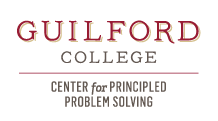
The Principled Problem Solving Model
The Principled Problem Solving (PPS) Model was developed by the Center for Principled Problem Solving at Guilford for the purpose of identifying and addressing complex problems while guided by the core values of an organization or individual to modify it to best address their particular context.
The PPS Model is unique among theories of leadership and change. While rooted in the Quaker heritage, it is inclusive of and relevant for use within multiple belief systems, and it can be used across multiple sectors. It assumes that diverse perspectives are necessary for seeking solutions, recognizing that complex problems require contextualized, collaborative, and adaptive approaches to change.
At Guilford College, the process is guided by the college's seven core values: community, diversity, equality, excellence, integrity, justice, and stewardship. Guilford College graduates are uniquely prepared through this process to serve as ethical, collaborative leaders in addressing complex problems in diverse contexts of employment and civic engagement.
Identify
Values: Before identifying "problems," it is crucial that an organization or individual spend time discerning the core values that they hold to be most central to their identities and to how they aspire to participate in society.
Capacities: Every organization, individual, and community, no matter how troubled, contains strengths, skills, and assets that can be utilized to solve complex problems in collaborative, ethical ways. In this stage, participants identify these capacities before identifying particular problems that they will address.
Problems: At this stage, participants raise to awareness a situation that is inconsistent with one or more of their previously discerned core values. The problem is then addressed through the lens of bringing this situation more in line with the institution's and/or individual's core values.
Research
Effective, principled problem solving requires an extensive research process. Through multiple forms of research, participants come to understand the complexity of a situation in relation to its historical and cultural contexts, stakeholders, and related organizations or individuals already working to address similar issues. The research process thus involves building collaborative relationships among diverse partners.
Discern
Once all of the research has been gathered, participants pause to discern, both individually and through the wisdom of the group, about all that has been learned and about which aspects of the problem can and should be addressed. In this stage of discernment, each person recognizes her or his motivation for engagement and willingness and energy to respond. The group evaluates their skills for equitable collaboration, and addresses any concerns that may have arisen.
Imagine
Creative, ethical change is not possible without imagination of an alternative future. In this stage, people imagine a positive future in relation to the issue they are addressing. They then generate innovative ideas toward making that vision a reality.
Plan
Participants move from creative imagination to critical analysis to identify which idea is most promising. They then engage in a detailed planning process, incorporating multiple perspectives through dialogue related to research findings. Participants pay particular attention to possible unintended consequences, and recognize that plans will likely require ongoing revision during implementation.
Act
Participants implement their plan, paying close attention to coherence with their core values and seeking feedback from all affected. They remain flexible, willing to reconsider their plans when necessary in order to maintain their integrity and to act most effectively.
Reflect
While reflection is integral to the implementation stage of principled problem solving (demonstrating the non-linear nature of this approach), participants also take time for intentional reflection, asking how they might improve their process and where they might address new problems or issues that have emerged.








